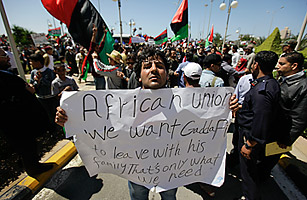
A protester holds a placard as an angry but peaceful crowd demonstrates outside the Tibesty Hotel where an African Union delegation was meeting with opposition leaders in Benghazi, Libya, April 11, 2011.
An African delegation on a mission to end the seven-week conflict in Libya received a hostile welcome in the rebel capital of Benghazi Monday. "No Gaddafi, no sons!" hundreds of protesters shouted as they swarmed the vehicles of the Presidents of Congo, Mali, Mauritania and Uganda. Inside the Tibesti hotel, the opposition Transitional National Council (T.N.C.) was just as unreceptive to the African Union's (A.U.) ceasefire plan. There had been some hope of diplomatic progress on Sunday, after Libya's leader Colonel Muammar Gaddafi accepted the plan presented by the African presidents. However, the TNC rejected the plan because it did not stipulate that Gaddafi relinquish power and leave Libya.
Among the plan's key points were an end to airstrikes by NATO, a cease fire, and a starting point for negotiations between the two sides. But the TNC was in no mood to confer with Gaddafi about a ceasefire, and on Monday they rejected the proposals offered by the African presidents. "It's very simple, and this is the Libyan people's opinion. If it does not include his departure, resigning his job, it won't be accepted by the street," T.N.C. spokesman Mustafa Gheriani declared. On the streets of Benghazi, residents were just as defiant. "We want him to leave and leave now. That is the only thing we are willing to discuss," said Husam al-Jawhari, 31, a few hours after the AU delegation ended talks with T.N.C. leaders.
The T.N.C. fears Gaddafi would use the ceasefire to consolidate his position and tighten his grip on the besieged Western city of Misratah, which is under rebel control. His past "truces" have been followed by further pushes towards Benghazi, leaving the rebels with little faith in his promises. "The world has seen these offers of ceasefires before and within 15 minutes [Gaddafi] starts shooting again," remarked rebel spokesman Shamsiddin Abdulmolah.
Though Washington and the European Union supported the initiative, they reiterated their call that Gaddafi step down. U.S. Secretary of State Hillary Clinton declared, "there needs to be a transition that reflects the will of the Libyan people and the departure of Gaddafi from power and from Libya."
With the international community demanding his immediate resignation, Gaddafi was happy to welcome an A.U. delegation that did not insist on his departure. African nations have long provided a diplomatic shield for the erratic Libyan leader who has showered their destitute countries with billions of dollars. In the 1990s, African countries flouted a United Nations flight ban imposed on Libya for downing an American airliner over Scotland. In 2003 they rebuffed Washington's protests and helped Libya secure the presidency of the U.N. Commission on Human Rights.
In the current conflict, they have proved just as obliging. While the E.U. and U.N. imposed sanctions against Gaddafi,, and his fellow Arab leaders denounced him and suspended his membership in the Arab League, A.U. members have refrained from condemning him. Instead, they denounced NATO's airstrikes against his forces.
That reluctance to fall into line with the international community's campaign against Gaddafi has made the T.N.C. wary of the A.U.'s attempts at mediation. Benghazi residents are equally suspicious of the Union, having watched Gaddafi hand over their oil wealth to their poorer neighbors rather than invest it in modernizing their country. "All these countries are good for is taking our money," lamented Khalid al-Atti, 28, on the Benghazi corniche as muffled patriotic songs blasted from speakers near the courthouse celebrating the Feb. 17 revolution. "Now they come back and want to help Muammar stay in his palace. Why should we listen to them?"
